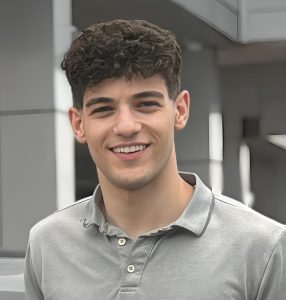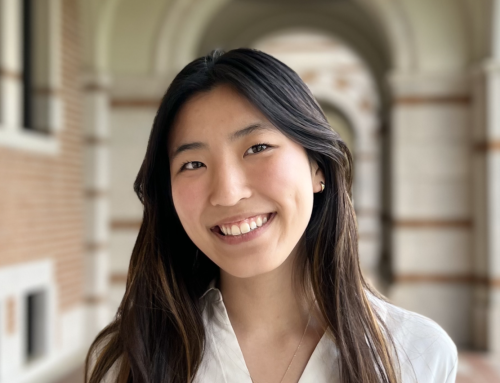We would like for you to meet Mohammad Hemeida, one of our new tutors helping students in the Hedwig Village location. Mohammad brings a wealth of experience teaching a variety of grade levels in subject and test prep, including working with students at University of Houston, Columbia University, New York Public Schools, and beyond. Mohammad is enthusiastically committed to fostering academic excellence in a way that is engaging and encouraging. Discover his unique approach to tutoring and his passions beyond the classroom.
 What subjects and classes do you help our students with?
What subjects and classes do you help our students with?
I specialize in test prep, whether for the SAT/ACT or ISEE, and also work with students on ELA and math up to the high school level.
What is your educational background?
I recently graduated from Columbia with a B.A. in Political Science and am now tutoring for General Academic while studying for the LSAT. I’ve previously taught SAT for The Princeton Review, coached middle and high school debate, and tutored 2nd, 3rd, and 7th graders in math and ELA. I also have extensive experience working in undergraduate admissions and currently interview Early Decision applicants to Columbia.
What is your favorite subject to tutor?
SAT, ACT, ISEE, really any standardized test, especially reading and writing sections. I find language and comprehension-focused sections of standardized tests to be the most fun and engaging because they challenge the test taker to think in a way they are not used to. Whereas math and science achievements often depend on knowledge and application of subject material; reading and writing questions directly confront our ability to think fast, clearly, and critically to weave through grammatical, logical, and interpretive flaws that take a well-trained eye to spot.
What does a typical test prep tutoring session with you look like?
I keep an internal clock and schedule– I always let the student know what we’ll be focusing on, but otherwise like the session to feel smooth and flexible to the student.
- Quick check in, chat about their week, updates in school, etc. to help ease them into the session and catch me up on anything and everything they’re excited about, proud of, or struggling with.
- Practice review and go over assigned problems. This has a dual purpose: spot patterns in missed answers to inform what I’ll have them focus on in the session, but also to ease them into material they might have not touched in a few days.
- Guided instruction targeting one or two high-priority skills or concepts. Here, I pay attention to how the student tackles problems, including listening to their thought process and giving hints along the way. I pose more challenging questions if the student is ready.
- Student-led instruction with guiding feedback. The purpose of this is to allow the student to implement what was just learned/corrected in the guided instruction portion. The expected improvement will also be a crucial confidence boost to motivate them to continue studying/practicing.
- Recap, emphasize progress, map out study plan, and assign practice questions. I make sure to explain how each assigned practice will prepare the student for our next meeting and will move them closer to their target score. I also like to take a couple of minutes to hear their thoughts about what we did today and how they’re feeling about their goal in general.
- Towards the end when they know the instruction part of the session is over, students might open up more than in the beginning when they may be more inclined to immediately dive into work.
What does a typical subject tutoring session with you look like?
Essentially the same work flow as test prep sessions, with a couple main differences:
- Ask student what homework/assignments they had this week, and what they feel we need to review.
- Priorities might depend on school deadlines instead of only focus areas.
- Course material and concepts in homework and upcoming tests are emphasized over testing strategies.
- Less time can be spent on tricker questions if the student clearly understood the content but had trouble applying specific strategies.
What’s your typical approach with working on executive functioning with your students?
I tailor executive functioning work to each student. For younger students, this can mean learning to use a calendar to track assignments, breaking big projects into smaller steps with deadlines, and practicing strategies to regain focus when distracted. I also make the work more engaging by connecting it to their interests and celebrating small wins. Over time, the goal is for them to build habits they can use independently in and out of school.
With older students, especially for test prep, we work on refining study schedules, simulating a test environment at home and eliminating distractions, reducing procrastination in the age of phones, and self-assessing progress so they can efficiently practice and improve during the week.
How do you view your role as a tutor?
As someone who’s had countless mentors and mentees throughout college and now as a young alum, I know the value of relatability in a tutor. I want my students to know that I’ve been in their place, that I understand how difficult it can be to find the will to study, but that I also know how accomplished they’ll feel when they see the scores or grades they’ve dreamt about. As a mentor, I take it upon myself to bring enthusiasm, drive, and confidence to every session because I know that I can only expect a student to be excited to learn if I exude excitement myself.
Having been trained as a teacher and credentialed to teach grades 7-12 in Texas, I also know the importance of leading with confidence and purpose. When it’s time to deliver content, review errors, and practice, I make sure the student can trust my instruction by demonstrating preparation and knowledge of subject materials. I encourage students to challenge my explanations, express their confusion, and ask endless questions. Ultimately, the goal is for every student to know that we’re in it together, and that whatever their goal is, they can trust me to get them to the finish line.
Tell me about one of your favorite sessions you’ve had.
In one of my larger SAT classes, I once had a student who was abnormally engaged. I loved it, but it was certainly more enthusiasm than I’ve ever seen a student have for a standardized test. The irony? That student was struggling the most. He absolutely despised practicing alone. It was obvious that our sessions were when he felt the most excited, when he felt he was really improving: something was clicking. He stayed with me for about 6 weeks, and by the end of it, his score had improved 130 points from his last official try. He was ecstatic. I helped him with college applications a year later, and to this day he still updates me about his classes at Brown.
What is your favorite part of being a tutor?
I still remember exactly how I felt when I’d get a question right after getting a similar one wrong on a previous practice. The joy students get from seeing themselves improve is infectious in the best way possible.
Outside of tutoring for us, what do you like to do for fun?
I love to read, swim, lift weights, and try out dinner spots. I also play tennis, squash, and backgammon!
If you could have dinner with anyone, who would it be and why?
Sonia Sotomayor – I have so many questions about her journey as a diabetic child of low income immigrants to the highest court in the land. I had the honor of meeting her a few times, and her autobiography remains the most inspiring book I’ve ever read.
Tutoring with General Academic
General Academic’s subject and test prep tutors provide the structured support to accommodate your student wherever they’re at. We help our students with a wide range of materials, ranging from 1st through 12th grade subject prep, ISEE, and SAT. To get the ball rolling, give us a call at (713) 838-7774 or fill out our tutoring request form.
 What subjects and classes do you help our students with?
What subjects and classes do you help our students with?



